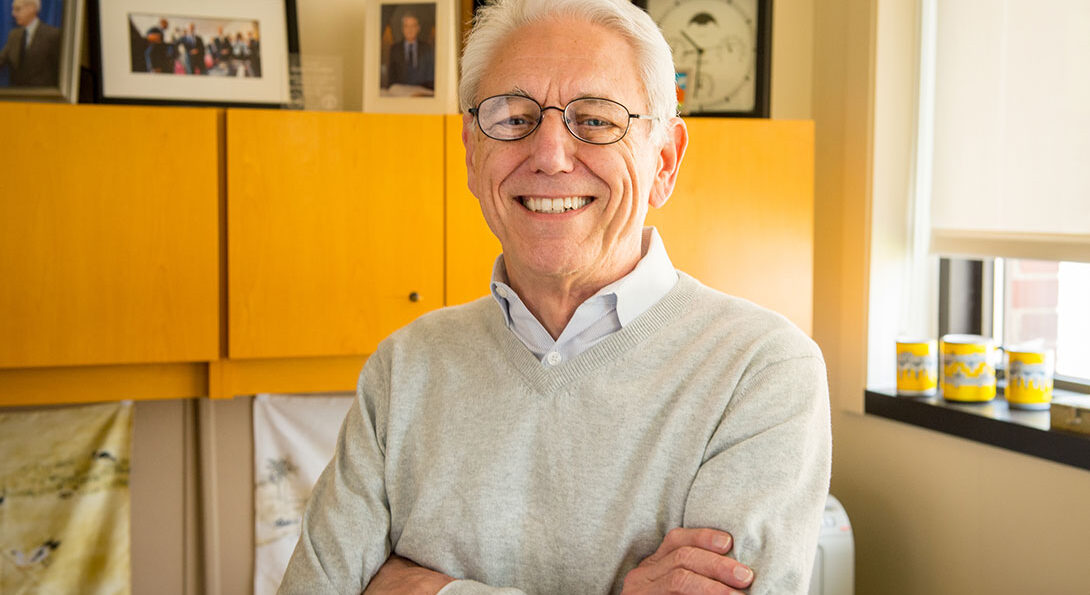George Crabtree, energy trailblazer remembered as a “great listener” and “boundless explorer,” 1944-2023

George Crabtree, director of the UIC Energy Initiative and distinguished professor of physics and electrical and mechanical engineering, died unexpectedly Jan. 23, 2023. He was 78.
Crabtree, an award-winning physicist, was widely known for his extensive research involving next-generation battery materials, sustainable energy, energy policy, materials science, nanoscale superconductors and magnets, and highly correlated electrons in metals.
His career included more than 55 years at Argonne National Lab, where he assumed the position of assistant physicist after earning a PhD in condensed matter physics from UIC in 1974. Most recently at Argonne, he was a senior scientist, distinguished fellow and director of the Joint Center for Energy Storage Research. In the latter role, he oversaw the overall strategy of the research program and operational plan, acted as liaison to executives of JCESR partner organizations and represented the program with external constituencies and advisory committees.
“He leaves an extraordinary scholarly and scientific legacy, and will be deeply missed by many,” said Lisa Freeman, interim dean of the College of Liberal Arts and Sciences.
“He has been a mentor, researcher, teacher, leader, inspiration, statesman and energy pioneer for so many of us,” said professors Robert Klie, David Hofman and Henrik Aratyn in a joint statement on behalf of the UIC department of physics.
Crabtree won numerous awards for his research, including the prestigious Kamerlingh Onnes Prize for his work on vortices in high-temperature superconductors.
Last year, the American Institute of Aeronautics and Astronautics named Crabtree winner of its Energy Systems Award, which acknowledges a significant contribution in the broad field of energy systems, specifically as related to the application of engineering sciences and systems engineering to the production, storage, distribution and conservation of energy. The institute noted that he was selected for “his seminal contributions to defining the next-generation energy system and innovative technological and workforce development pathways to achieve it.”
He also was a two-time recipient of the University of Chicago Award for Distinguished Performance at Argonne and a four-time recipient of the U.S. Department of Energy’s Award for Outstanding Scientific Accomplishment in Solid State Physics. He received an R&D 100 Award for his pioneering development of magnetic flux imaging systems.
Crabtree led Department of Energy workshops on hydrogen, solar energy, superconductivity and materials under extreme environments and co-chaired the Undersecretary of Energy’s assessment of DOE’s Applied Energy Programs. He testified before the U.S. Congress on the hydrogen economy and on meeting sustainable energy challenges.
He was a fellow of the American Physical Society, a charter member of the Institute for Scientific Information’s Highly Cited Researchers in Physics, a member of the U.S. National Academy of Sciences and a fellow of the American Academy of Arts and Sciences.
Crabtree’s lofty status in the global scientific community was bolstered by his more than 440 papers published in leading scientific journals, more than 18,000 career citations and over 150 invited talks presented at national and international scientific conferences.
He also was a member of UIC multidisciplinary research teams in multimillion-dollar, federally backed projects addressing climate change and undergraduate research mentoring in science, technology, engineering and mathematics.
In late 2022, he was a key part of UIC’s involvement with the Midwest Alliance for Clean Hydrogen, called MachH2, a multistate coalition of public and private entities that applied to the U.S. Department of Energy to develop a regional clean hydrogen production and distribution hub to be funded under the Infrastructure Investment and Jobs Act.
In 2011, Crabtree launched the UIC Summer Institute on Sustainability and Energy, a workshop and lecture series for future energy and sustainability leaders. More than 500 alumni in positions in government, industry and academia have attended the annual workshop, which challenges participants to think creatively about how the world can power itself in a sustainable way.
Crabtree came to UIC in 2010 as a professor of physics and a special adviser to the provost and chancellor on restructuring campus energy and sustainability efforts.
In an interview about his return to campus, he told a College of Liberal Arts and Sciences magazine that he looked forward to drawing from the university’s diversity of disciplines and channel new ways of thinking to the students.
“Public research universities play a key role in society — they draw students from the widest and most diverse backgrounds, they expose these students to high-level-thought leaders, and they often produce outstanding researchers, teachers, legislators and businesspeople that otherwise would be lost to society,” he said.
Crabtree added, “There is an opportunity to bring people together to embrace the multidisciplinary challenges and help guide the historic transition from traditional to more sustainable energy.”
The Hillside, Illinois, native received his bachelor’s degree from Northwestern University and a master’s degree from the University of Washington in Seattle.
He is survived by his wife, Barbara, and preceded in death by his son, Mark.